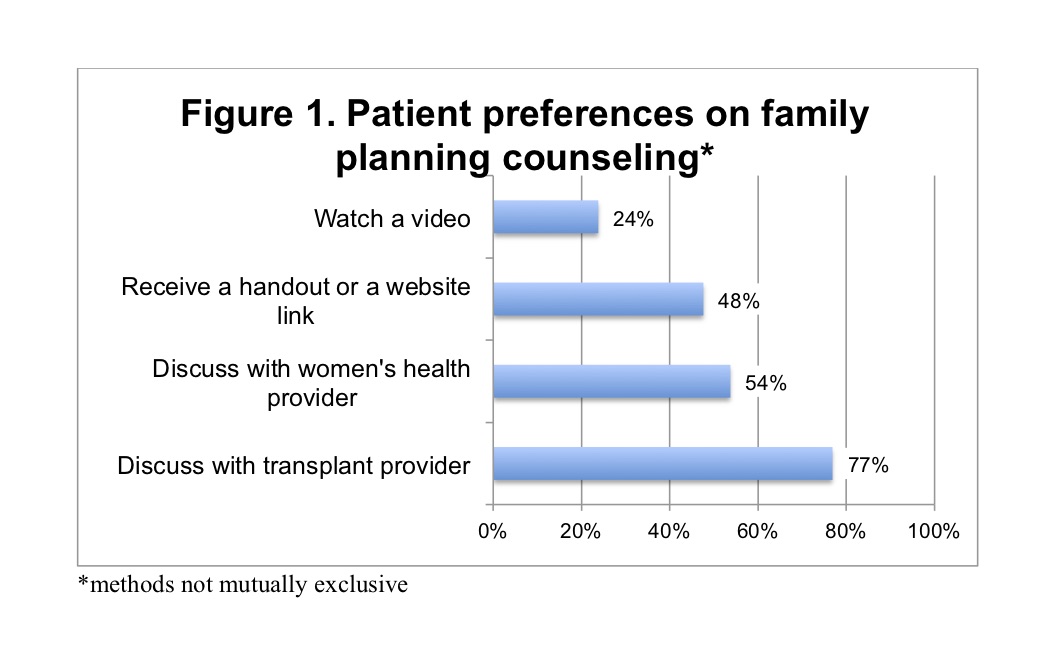Deficiencies in Family Planning Counseling and Practices in Kidney Transplant Patients
J. Ritchie1, D. Seidman2, Y. Srisengfa2, E. Perito2, D. Adey2, M. Sarkar2
1St Luke's University Health Network, Bethlehem, PA, 2UCSF, San Francisco, CA
Meeting: 2020 American Transplant Congress
Abstract number: D-070
Keywords: Kidney transplantation, Patient education, Pregnancy
Session Information
Session Name: Poster Session D: Kidney Psychosocial
Session Type: Poster Session
Date: Saturday, May 30, 2020
Session Time: 3:15pm-4:00pm
 Presentation Time: 3:30pm-4:00pm
Presentation Time: 3:30pm-4:00pm
Location: Virtual
*Purpose: Nearly 20% of female kidney transplant(KT) recipients are reproductive-aged. Fertility is often impaired pre-transplant, but rapidly restored after KT. Early and unplanned pregnancies after KT increase maternal and fetal risks, though data on reproductive counseling in this population are lacking.
*Methods: Female patients ages 14-45 years who were listed or with previous KT at our center(n=682) were invited to complete a one-time, 65-question, online Qualtrics survey in 2019. Survey questions evaluated patient experiences and preferences surrounding family planning counseling in the setting of KT.
*Results: 162(24%) patients(50 pre- and 102 post- KT) initiated the survey. 147 (22%) completed it(50 pre- and 102 post-KT). 25% were White, 30% were Hispanic, 10% were Black, and 15% were Asian. Among pre-KT patients, 1(2%) was ≤18 years. Among post-KT patients, 6(6%) had transplants at <14 years old, and all were ≥18 years at time of survey, with median time since KT of 6 years. Regarding pregnancy counseling, 22(15%) were advised never to conceive, 9(6%) were told pregnancy was not possible after KT, and 25(17%) were not counseled about family planning as it related to transplant. At time of transplant, one quarter(26%) were unaware that future pregnancy was possible. Two women had pregnancies in the first year post-KT, one miscarried. The majority(78%) of sexually active women used birth control in the first year post-KT, although a third(30%) exclusively used high failure methods, such as barrier methods. Two women reported using no contraception due to hopes to conceive during the first year post-KT. Only half(52%) of surveyed women felt their pre-KT reproductive counseling was adequate, although more(64%) reported satisfaction with post-KT counseling. Most respondents felt family planning counseling was important to receive during both the pre-(77%) and post-KT(81%) time periods, although only 47% of women would have wanted to discuss contraception prior to hospital discharge post-KT. Regarding counseling preferences, only 51% received counseling from transplant providers, although this was the single most favored counseling modality(Figure 1).
*Conclusions: Family planning was commonly discussed with KT patients, although information was not consistently accurate. Many women used contraceptive methods with high failure rates. Given maternal and fetal risks of early and unplanned pregnancies, systems-based interventions that optimize women’s preferred means of counseling should be implemented in this medically complex population.
To cite this abstract in AMA style:
Ritchie J, Seidman D, Srisengfa Y, Perito E, Adey D, Sarkar M. Deficiencies in Family Planning Counseling and Practices in Kidney Transplant Patients [abstract]. Am J Transplant. 2020; 20 (suppl 3). https://atcmeetingabstracts.com/abstract/deficiencies-in-family-planning-counseling-and-practices-in-kidney-transplant-patients/. Accessed July 18, 2025.« Back to 2020 American Transplant Congress

